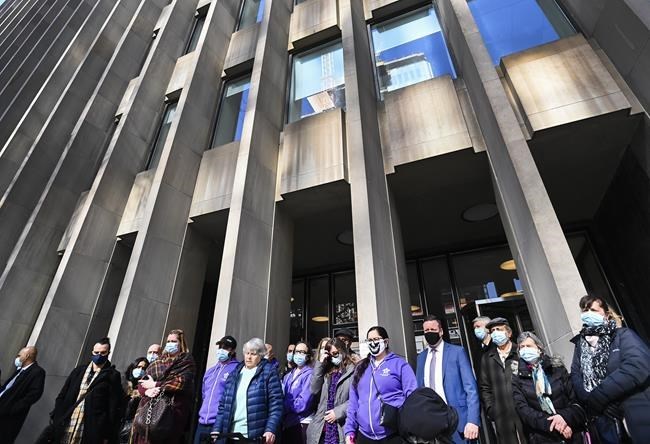TORONTO — Relief washed over victims of the Toronto van attack Wednesday after the man responsible for the rampage was found guilty of murdering ten people and trying to kill 16 others.
Justice Anne Molloy said Alek Minassian carried out the 2018 van attack to achieve notoriety and was fully aware of the devastation he had caused.
"He desperately wanted to achieve fame and notoriety, believing even negative attention for his actions would be better than to live in obscurity," said Molloy, whose judgement was delivered via video conference and broadcast on YouTube.
Minassian had admitted to planning and carrying out the attack on April 23, 2018, but had argued he should be found not criminally responsible for his actions because of his autism spectrum disorder.
The key issue at the trial, which began last November without a jury, was whether he had the capacity at the time of the attack to make a rational choice.
The 28-year-old from Richmond Hill, Ont., had pleaded not guilty to 10 counts of first-degree murder and 16 counts of attempted murder.
Molloy found Minassian guilty on all 26 counts and took the unusual step of not naming him in her ruling, saying she'd refer to him only as John Doe because she did not want to contribute to his desire for infamy.
"Mr. Doe knew that the vast majority of people in society would find an act of mass murder to be morally wrong," said Molloy.
"He chose to commit the crimes anyway, because it was what he really wanted to do. This was the exercise of free will by a rational brain, capable of choosing between right and wrong."
Elwood Delaney, whose grandmother Dorothy Sewell died during Minassian's rampage, welcomed Molloy's ruling.
"I'm relieved that he was found guilty," said Delaney, who watched the proceedings from his home in Kamloops, B.C.
"We now can start to close this awful chapter and try to move on to a new norm."
Robert Forsyth, whose 94-year-old aunt Betty Forsyth died after being hit from behind by Minassian, also expressed relief.
"I'm happy with the decision, although it's hard to use the word happy when you lose a loved one like this," he said. "It was clear he knew what he was doing."
Catherine Riddell, who was brutally injured in the attack, said her years-long anxiety has abated.
"I probably will sleep tonight for the first time in a while," she said.
"It was the best I could hope for ... He can spend the rest of his life in jail because he deserves it."
First-degree murder carries an automatic life sentence with no chance to apply for parole for 25 years. Minassian's case is set to return to court on March 18 to discuss next steps for sentencing.
Joe Callaghan, the lead Crown attorney, called Molloy's decision a "fair and just result."
Turning to some of the victims and their supporters assembled behind him outside a Toronto courthouse, Callaghan commended them for their resilience.
"Despite your continuing pain and trauma from this horrific attack, you showed us how love and humanity can prevail."
Minassian's lawyer, Boris Bytensky, said the focus should not be on his client.
"The victims are the victims and should forever be at the forefront of our thoughts," Bytensky said.
He said he had spoken only briefly to Minassian after the judgement and didn't know if his client plans to appeal.
Toronto Mayor John Tory said the city will continue to support the victims and everyone affected by the tragedy.
The Crown had argued that Minassian is a mass killer who knew right from wrong — and happens to have autism.
But the defence argued that because of autism, Minassian never developed empathy, and that lack of empathy left him incapable of rational choice.
Molloy rejected that argument.
"It does not matter that he does not have remorse nor empathize with the victims. Lack of empathy for the suffering of victims — even an incapacity to empathize, for whatever reason — does not constitute a defence under Section 16 of the Criminal Code," she said, referring to the not criminally responsible section.
The trial heard Minassian fantasized about mass killings for years, starting when he was in high school, where he was bullied.
At one point he became fixated on an American mass murderer who hated women. He joined an online community of so-called "incels" — males who are involuntarily celibate.
Minassian told a detective hours after the attack that he sought retribution against society because he was a lonely virgin who believed women wouldn't have sex with him.
But he later said that was ruse designed to increase his infamy.
Three weeks before the attack he booked a rental van for the day after he completed his final college exam, court heard.
Around 1:30 p.m. on a warm April day, Minassian sat in the driver's seat at Yonge Street and Finch Avenue at a red light.
When the light turned green, he floored it, hopped the curb and began the attack. He was arrested moments later following a failed attempt to commit suicide by cop.
Betty Forsyth, Ji Hun Kim, So He Chung, Geraldine Brady, Chul Min Kang, Anne Marie Victoria D'Amico, Munir Najjar, Dorothy Marie Sewell, Andrea Bradden and Beutis Renuka Amarasingha died in the attack.
—With files from Nicole Thompson and John Chidley-Hill.
This report by The Canadian Press was first published March 3, 2021.
Liam Casey, The Canadian Press



